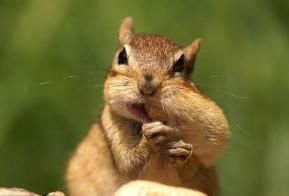by Trudy Irvine, Member Education Committee
Over the last year have you:
- Observed social distancing?
- Stockpiled “supplies” (raised eyebrow) for an upcoming period of enforced isolation?
- Spent the winter in your burrow, emerging from a state of torpor only to raid your larder?
Well then, you and the species Tamias have a few things in common. A rodent with a much better public image than the deer mouse (or the red squirrel), the presence of chipmunks is celebrated by most cottagers.
It is surprising that these little animals, so quick to befriend humans bearing handouts, prefer to remain solitary. Each chipmunk has its own burrow, and ignores its fellows except during mating, caring for young, or when others trespass too close to the entrances of those burrows. However, they are not territorial beyond the dominance area immediately outside the burrow and their home ranges overlap broadly, varying from 1/2 to 1 acre.
Chipmunks dig two types of burrows: shallow burrows in which they seek refuge while foraging during the day, and deeper, more complex burrows where they nest, store food and spend most of the winter months.
In spring, chipmunks can be observed searching the ground for any seeds that remain from the previous summer. As these are usually scarce, the small rodents eat young leaves and shoots until new fruit and seeds become available. Throughout the spring, summer, and autumn, the chipmunk’s diet is supplemented with insects, earthworms, flowers, berries, and mushrooms. Although most species of chipmunks usually forage on the ground, they all easily climb trees and shrubs.
As summer wears on, chipmunks spend much of their day collecting and storing nuts and seeds, which are their most important winter food source. Food is carried back to the burrow in the chipmunk’s prodigious cheek pouches, which increase in size as the chipmunk ages.
With the onset of winter in November, chipmunks disappear below ground. They survive the cold in their burrow by entering periods of torpor- a state in which their body temperatures, rate of breathing, and heart rates drop to very low levels, reducing the amount of energy they require. Periods of torpor last from one to eight days, and perhaps longer. Between periods of torpor, they rouse themselves to consume part of their food supply. (Does any of this sound familiar?)
It has been a delight to see the chipmunks busy again this year. The chirping and purposeful scurrying of these industrious charmers is a pleasure to witness. Here is more information on chipmunks.
